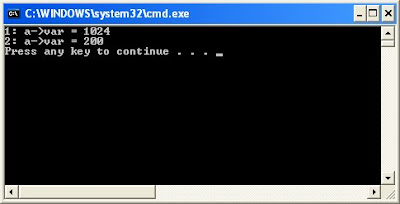"const correctness" means using the keyword const to prevent const objects from getting mutated.
In this example we show passing by pointer-to-const. In case of pass by pointer-to-const, any attempts to change to the caller's variable within the function would be flagged by the compiler as an error at compile-time. This check is done entirely at compile-time: there is no run-time space or speed cost for the const. Also passing by pointer-to-const is more efficient as it avoids temporary objects.
So here is the example:
//Program tested on Microsoft Visual Studio 2008 - Zahid Ghadialy
//Simple program to show const pointers
#include<iostream>
using namespace std;
class A
{
public:
int *var;
};
void someFunc(const A* a)
{
//int b=200;
//a = &b; - Not Possible to convert int* to const int*
// We can use a const_cast but thats not the purpose here
*(a->var) = 200; //Possible to change value of const pointer
}
void anotherFunc(const A* a)
{
if(a)
{
if (a->var)
delete a->var;
delete a;
}
}
int main()
{
A *a = new A;
a->var = new int(1024);
cout<<"1: a->var = "<<*(a->var)<<endl;
someFunc(a);
cout<<"2: a->var = "<<*(a->var)<<endl;
anotherFunc(a);
//cout<<"3: a->var = "<<*(a->var)<<endl; - Not Valid
return 0;
}
The output is as follows:


No comments:
Post a Comment